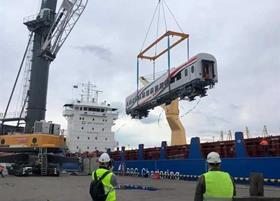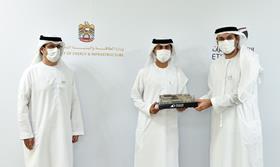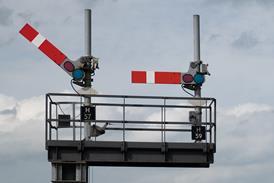
An assembly line at Transmashholding’s Demikhovo factory has been reconfigured to undertake the overhaul of ED4M EMUs, increasing the plant’s refurbishment capacity to 200 cars per year. Further expansion is underway to handle TR-3 overhauls of EP2D EMUs from mid-2021, including a partial remodelling of the workshop, additional tracks and the optimisation of maintenance practices.
Siemens Mobility has launched MoComp as a consolidated source of information about its range of rolling stock electrical and mechanical components, including pantographs, propulsion systems, bogies, brakes and onboard power supplies. ‘This portfolio is specifically developed for the needs of the industry from the perspective of a vehicle manufacturer’, said Albrecht Neumann, CEO Rolling Stock. ‘MoComp will provide rolling stock producers, OEMs, and operators the opportunity to conveniently acquire individual components and entire systems that will help them optimise and improve the performance of their rail vehicles.’
Rail telecoms monitoring technology company Expandium and cyber security specialist Cervello have announced an alliance to provide security and predictive maintenance capabilities for ETCS, GSM-R, FRMCS and interlockings. ‘We have identified Cervello as the key and game-changing cybersecurity player in the industry, able to optimally complement our successful monitoring solutions already deployed and trusted by most European railway operators and infrastructure managers’, said Expandium CEO Pierre Cassier.

Russia’s Sberbank has structured 4bn roubles of export financing to support TMH Tver’s 2018 contract to supply 1 300 coaches to Egyptian National Railways. ‘The supply of passenger coaches to Egypt is TMH’s contribution to the development of non-commodity exports, which has been given great attention by the President and the government of Russia in recent years’, said Dmitry Amelin, Director for Economy & Finance at Transmashholding. ‘I am sure that the positive experience of co-operation with Sberbank within the framework of the Egyptian contract will allow us to operate in other countries.’
Beijer Group’s mission-critical data communications subsidiary Westermo has acquired 100% of ELTEC Elektronik AG. ‘With the acquisition of ELTEC we widen our offering within smart connections on board trains and metros and going forward also trams and buses’, said Westermo CEO Jenny Sjödahl. ‘ELTEC has a strong position among many of the larger European train operators. The need for modern infrastructure in public transport will continue to increase and Westermo will for sure play an important role in the digitalization of the European as well as the global train fleet.’
INIT has merged its Initplan and Initperdis subsidiaries, responsible for planning and personnel dispatching systems, to form INIT Mobility Software Solutions GmbH which has 70 staff in Karlsruhe, Braunschweig and Hamburg. ‘Planning and dispatching are core operational processes of a transport company’, explained Managing Director Ulrich Schmidt. ‘The new INIT company occupies a stronger market position than the previously separate entities, with more resources in development, enabling us to respond even faster to new customer requirements.’

UAE’s Ministry of Energy & Infrastructure has signed an agreement to collaborate with Etihad Rail on the issuance of safety permits for Stage Two of the national rail project.
Ruf Group has appointed SepsaMedha Brasil as its service and sales partner for the South American market. SepsaMedha will distribute and support the VisiWeb passenger information system, products and spare parts and provide services including installation, testing and maintenance. The largest vehicle fleets equipped with VisiWeb outside Europe are in São Paulo, where it is used by Metrô São Paulo and CPTM.

Telecoms company BT has been awarded a five-year contract to upgrade Alstom’s global communications network with a VMware SD-WAN cloud-optimised system connecting 350 locations in 60 countries, including manufacturing plants, offices, depots and data centres. This will provide secure access to company applications and services used by Alstom’s employees, including 24 000 staff who have been working remotely during the pandemic. ‘The move to internet as our primary network is part of our Alstom in Motion strategic plan’, said Nicolas Vurpillot, Network & Network Security Director at Alstom. ‘It will provide secure, scalable and reliable access to applications while reducing cost and improving co-management. Following a thorough assessment of available SD-WAN technologies, BT demonstrated willingness and capability to innovate, enhance service levels and partner with Alstom.’

















